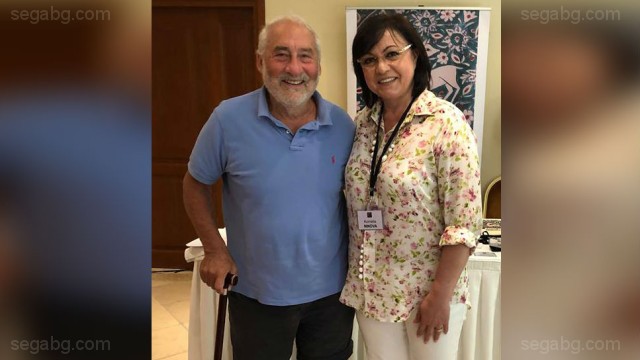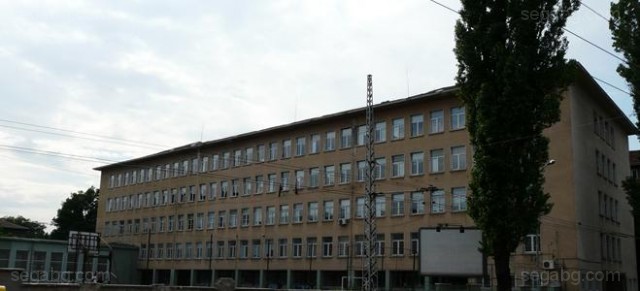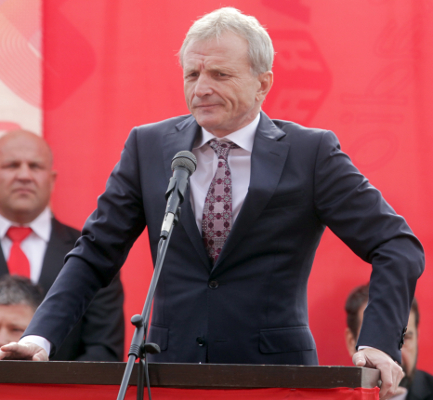Дясното политическо пространство добива свойства, които подозрително напомнят за особености на същото пространство отпреди век и кусур.
Говоря за това, че десните партии усилено замазват своите идейни различия и усилено изтъкват на преден план персоналните.
Какво сте чули за различията между г-н Костов, г-жа Михайлова и г-н Софиянски - от самите тях? Подчертавам: ние знаем много за техните различия. Ние сме установили, че има такива. Ние подозираме за още.
Но какво са ни казали самите те? Единствено лични особености.
Че онзи краде. Че другият е помияр. Че третият има гараж. И естествено, че "аз" съм доказал се и верен...
Но това е класическа картина. Може ли някой да си припомни сега името на партията на Радославов например. Та дори и на партията на Стамболов? Едва ли, освен ако е професионален историк или инквизиран кандидат-студент.
Не помним обаче съвсем не защото сме проявили небрежност. А защото това няма никакво значение! Казват се там някак си, най-често нещо "либерали" звучи при всичките в заглавието... Но не е важно, наистина не е важно.
Сега така навсякъде звучи "демократи": съюзени демократи, свободни демократи, демократични демократи, всякакви. Но не името на конкретната партия дава идентичността; както преди 100 години имаме "стамболовисти", "радославовисти"...
Но от друга страна ние знаем: единият е по-хард, другият по-гъвкав. Единият е с диктаторски навици, другият прилича повече на шеф на рекламна агенция. Какво е това наше значение? По какво всъщност ги различаваме?
И по какво, следователно, се различават всъщност те?
Идва ми наум само един възможен отговор:
Главното различие на всички тези "истини"
е по въпроса: с кого този еди-кой си може да се съюзи?
Например за г-н Костов интуитивно усещаме, че той може да се съюзи само със самия себе си. За г-жа Михайлова предчувстваме, че тя може пък и да се съюзи с някого. Г-н Любен Дилов-син ни вдъхва чувството, че той просто не може да не се съюзи. Както и г-н Софиянски.
Г-н Сакскобургготски тук е в съвсем особена ситуация: за него можем да сме предварително сигурни, че страшно ще ни изненада със следващия си съюз. И второ, че ще се съюзи едновременно с двама партньори (най-вероятно такива, които не могат да се траят помежду си...).
Има и цял ред по-дребни играчи вдясно, за които общият знаменател звучи малко обидно: ще се съюзят с когото и да било, стига да оцеляват.
За да изчерпим теоретическите варианти, трябва да се подсетим и за г-н Петър Стоянов. Не бидейки шеф на партия (засега) той стои в съвсем екзотична поза: предлага да се съюзи със всички!
Така че цялата палитра от възможни типове съюзяване нашите десни вече са реализирали. (Ще си позволя фраза, понятна само за малка част от образованата публика: нашите десни живеят в това отношение, спазвайки принципа на Паули - никой не е в едно и също квантово състояние!)
Казано понятно и за невнимавалите в 11-ти клас по физика:
предстои да видим не просто пазарлъци, а различни типове пазарлъци.
Докога? До кой момент?
Очевидно е, че за изборите през 2005-а нищо освен частични съюзявания няма да видим. Първият възможен момент на дясното обединение, следователно, е съставянето на ново правителство. Но има и един по-следващ момент, в който дясното обединение вече не е просто възможно, а почти сигурно: и това са президентските избори през 2006-а.
Така че залагам каса бира - в Европа ще влезем с обединено дясно.
-----------------
Други текстове от същия автор: http://www.Raichev.org
За отзиви и коментари: A.Raichev@gallup-bbss.com

Чува се само гласът на енергийните дружества, допълни омбудсманът
Манолова даде петдневен ултиматум на работодателите да предвижат проекта
От ВМРО и „Атака” обявиха, че няма да подкрепят ГЕРБ и ще гласуват против предложението
Платформата протестира срещу бъдещия закон за авторското право в онлайн средата

Корнелия Нинова споделяла идеите на Джоузеф Стиглиц

Дванайсет момчета може да прекарат месеци блокирани в пещера в Тайланд (видео)
СТАТИСТИКИ
| Общо | 447,806,718 |
| Активни | 315 |
| Страници | 26,045 |
| За един ден | 1,302,066 |
|
Жестикулации
Партиите се различават по съюзниците си |
|
06 Февруари 2004 22:26
Чета ужасни неща за комунистите
Влязоха гадовете и в Европа Да се спрат ...казва Надежда Но не уточнява кои А в това е проблем Тукашните комунисти са братя на европеската народна партия - имат и искат да продължат да имат народа както си искат Само че там в Европа - те се казват народни, а тук - в България - те се казват комунисти Остава да се изясни кои са антикомунистите - там и тук Редактирано от - Минавам от тук на 06/2/2004 г/ 22:27:33 |
|
06 Февруари 2004 22:32
Ех ти г–н Райчев, една каса бира. Не е сериозно, не е класно. А след нафтата на БСП и още ако знаете само какво ще и се стовари на столетницата, победата на избори 2005 и 2006 от противниците на БСП е вече неизбежна. Аз залагам контейнер уиски /марката не уточнявам за да не стане гаф/. Като уточнение мога да добавя "така наречените десни" , тъй като в БГ няма десни,
а има само дясна фразоология и то само в определени моменти. Важното е омазаните олигофрени да не гушнат власта и облагите от ЕС, а как им се иска....горките, те не знаят че за да изчистиш нафтата трябва много години...какво да се прави – партийна екологична катастрофа, има да се лижат. Дори големият "български" политик с птиче име, гушнал не малко от далаверата БСП /нафта/ и известен с всеядноста си започна да се мръщи на подаваните му филийки с дъх на нафта, ами все пак човека е естет, я вижте какви булки си взема, какви задява. Е, нали казват че е много умен – и той ще се пише еколог – демек против нафтата /БСП/. |
|
06 Февруари 2004 22:44
Г-н Райчев хубаво хортува, ама защо ни лъже, че Костов, Софиянски и Надка са дясно, а пък Станишев ляво пространство. Грешка г-н платен манипулатор. Те са от едно и също просранство - криминалното. В Европа ще влезем, когато горепосочените господа ги видим обединени в затвора. Та нима някой си прави илюзията, че по нещо се различават Премянов, Бакърджиев, Христо Бисеров, Кошлуков, Севлиевски. А иначе умни хора са измислили деленето на ляво и дясно. Бих гласувал само за един български Пиночет.
|
|
06 Февруари 2004 22:44
Принципът на Паули и българската политика... Браво Райчев, самоходна енциклопедийо. И как небрежно - елегантно обиди мнозинството: необразованите и образованите, които не знаят принципа на Паули. Ама това е опасно, защото както сме в необратима демокрация, ще вземе това мнозинство да гласува отмяната на приципа на Паули...
|
|
06 Февруари 2004 22:56
Да бе
Голяма тайна - кои са комунистите тук Ама все същите - викачи за всеобщото благо в своя полза и против всичко останало Имам и "spisaka" им Започва и свършва с всичко злобно и мръсно тук Такива са днес, каквито бяха вчера Такива искат да бъдат и утре Нямат цвят, нямат мирис - ухаят на всичко, което е пари и келепир |
|
06 Февруари 2004 23:24
Oste ednoprozrenie na g-na Raiceva ! Vsicki sa maskari ! Vmesto s fizikata , po-dobre e s drevnite makedonci -Panta rei ! Ne mozesh da se okwpesh dva raza v edna i swsta voda ! V edna zatvorena sistema g-sin Raicev samovolno -spontanno proticat samo procesi svwrzani s namaliavane na energiinoto i swstoianie !-ENTROPIINA SMWRT !
|
|
06 Февруари 2004 23:34
Za da stanat vwzmozni prehodi ot po-niski kwm po-visoki energiini niva sledva da se vnese energia ot vwn ! Taka li e u nas ? Ne! Nie iznasiame pari i coveci -samo za Francia i Belgia prez 199899-zaminaha 30000 prostitutki ! Prez 1996-ta po oficialni danni 2tona dollarovi packi napusnaha stranata ! Onzi den biah na edno parti-ne ti e rabotata -Harclwcite na semeistvoto previshavat prihodite prez poslednite dve tri godini desetokratno -e tam imashe pone 15 takiva semeistva !
I vse "patrioti " Mila Rodino puskaha daze edin mi kaza Ei az swm makedonec be 1 I zapia -Nikola Nikola Pirinski unak ! Nikoi ne smiata da se vrwsta ! znaete li koga sa doshli ? Dve vwlni -pwrvata 90-91-va a vtorata -96-97-ma ! Pa takiva liberali -Bogdanov -nash covek ! Ivan Assen Georhgiev -nevinen ! |
|
06 Февруари 2004 23:45
Energia v BG vinagi e bila vnasiana ot vwn ! Dano mladite go storiat ! No sega polozenieto e hudze gubernatorskogo .Tuk v USA moga da vi kaza ce swsto ima patova situacia ! Govori se za dvoika demokraticna -Kerry i MacKein -poslednia stial da privlece repiublikanski glasove zastoto mrazel Bush ? Taka i Kenedy vsel Johnson-zaradi Texascite !a i dvamata bili veterani , Vednaka zapocna TV lansirane na Mac Kein ! a Bush predlozi da go vkluci v komisiata za razsledvane na razuzbnavaneto !
Brei ste kazt niakoi USA -OF ! Da ama tova znaci borbata s isliama da prodwlzi - Drwzte se ! Tazi dwrzava deistvitelno ne se upravliava ot Pravitelstvoto a ot "naroda " No godinata ste e kraino dramaticna ! |
|
06 Февруари 2004 23:59
Стопли се времето и на Райчев само каси бира му се въртят в главата - и от там и такъв анализ днес. Чунким няком може да направи разлика между Камов, Кр. Петков и Ал. Томов. За каса бира дори мога да се напъна да си спомня как им се казваха трупите. Ето, и мене ме хвана бирата. Въртя суча - и все до нея стигам. И ето какво си мисля:
Барам бира в бара бира с риба барабар барам буре бира Бура бурна бира бира барам бира бира в бара брав Иху! Такива ми ви работи за обединението вдясно |
|
07 Февруари 2004 00:11
Макар, че се считам за десен, статията на А. Райчев много ми харесва и на моменти здравата ме развесели.
Разграничаването на партиите по името на лидера им в същност е белег единствено за авторитарния характер на същите тия партии. Същото е било в миналото, за съжаление. Това просто означава, че обществото не е структурирано за да излъчи естесвени представители на лявото, дясното и центъра. Тук имаме противници, наметнали условно леви, десни или центристки воали. Нито БСП са леви, нито СДС са десни. Елитите им са еднакво забогатяващи, електората им е едномисловен, дори и най-твърдите им ядра. Царят като представител на традиционна консервативна надпартийна институция е центрист, а това за либерализма е по скоро в икономическата сфера. Макар формално партията му да носи неговото име, НДСВ-то е може би най-неавторитарната партия в нелявото пространство. Аз никак не бих се учудил, ако Царят успее да остане начело на едно бъдещо българско правителство, коалирало ярки противоположности. И това ще е най-доброто може би. Иначе държавата ще се свлече до непоносим провинциализъм в момент, когато ще трябва да влизаме в една определено над-провинциална система като ЕС. |
|
07 Февруари 2004 00:14
Добре жестикулира Андрей Райчев този път.
Може би, защото, за читатели си избрал само отличниците от 11 клас, но все още пред матура. Защото, иначе щяха да му задават доста прецизиращи въпроси, на които както той, така европейските му професори, класирали българските партии на ляви и десни щяха само да мигат. Защото, ние в България има 200 партии и нито една от тях нито е лява и нито е дясна. Те са (на теория и практика), както ги нарекъл един проницателен англичанин в Европарламента само една СБИРЩИНА. Не електоратът, а само лидерите на всичките тези 200 партии са една сбирщина от един и същ кюп. Лявото на левите, както и дясното на десните е едно също, без някаква микронна разлика, даже за мерило да приложиш квантова теория. Основателно е учудването на Минавам оттук.  Основателно е възмущението на Фантата.  Прав е Девил.   |
|
07 Февруари 2004 00:23
Извинявам се на всички и на Тим също. Просто има неволно съвпадения в някои от мненията. Вината е в дългия ми тел. разговор междувременно, и чак на края да натисна ОК.
|
|
07 Февруари 2004 00:23
Wolfgang Pauli ima oshte mnogo i interesni otkritia.Ima i edin trud za Arhetipovete "Easter dream" about the four eggs, is an imaginative representation of the four causes, the same concept that had been captured in an abstract way by Aristotle .Taka 4e drugariu Rai4ev po krotko s ognenata voda.Nazdrave dami i gospoda!
|
|
07 Февруари 2004 00:31
Az kato tapitalist tribva znachi da sum vdisno. Dobre, ama ne. I tuk neshtata opirat do otnositelnostta. .....Chast ot telefonen razgovor:
m: kade da te chakam? G. pri pametnika na Paisii m; ot koia strana/ G: ot liavata M: liava na kogo G: dobre de, ot diasnata... Az ne burzam da se obedinyavam... sos |
|
07 Февруари 2004 00:33
Tova e ot Pauli:"This isn't right. This isn't even wrong."
Atova e ot mene:" Tova e porednata tupotia" |
|
07 Февруари 2004 00:45
An odd half-integer spin particle. Fermions act on each other by exchanging bosons. Examples include leptons (such as the electron), neutrons, protons and quarks. They are indistinguishable, have antisymmetric wave functions, and obey Fermi-Dirac statistics. Fermions obey Fermi-Dirac statistics. |
|
07 Февруари 2004 00:48
An integer-spin particle which mediates forces between fermions. Odd spin bosons mediate repulsive forces; even spin bosons mediate attractive forces. Bosons of the same type are indistinguishable and have symmetric wavefunctions. Bosons obey Bose-Einstein statistics.
|
|
07 Февруари 2004 00:54
A class of fermion whose members participate in weak, electromagnetic, and gravitational interactions. Every lepton has a corresponding antilepton. All leptons have lepton number 1, while all antileptons have lepton number -1.
|
|
07 Февруари 2004 01:04
Народно-Либерална се казва партията на Стамболов и на Радославов (някъде я преименуват на Национално-Либерална, ама аз предпочитам българската дума).
Не съм правил никакви справки, не съм историк и не съм бил никога студент по история. Та това, което исках да кажа на Райчев е, да не съди за другите по собствената си ограниченост. |
|
07 Февруари 2004 01:33
3 минус. Принципът на Паули се отнася до комбинация от атрибути (маса, скорост, енергия, спин), а не до комбинация от връзки. Първото не дава възможност няколко (а не една, както непохватно е пише авторът) частици да се намира в еднакво състояние в даден момент в даден атом.
Второто е практически неизчерпаемо, както показва броят различни молекули в химическия свят или неизтощимия политически промискуитет (последната думичка се учеше някъде в 9-ти клас). |
|
07 Февруари 2004 01:42
Daaa, mejdu drugoto Wolfgang Pauli e evrein priel Katolicizma.A ne kato Rai4ev-Bezvernic! I pak Nazdrave!
|
|
07 Февруари 2004 01:50
Тамам значи си мислех, че цял уикенд не ни мърда преговор на физиката и, хоп, стигнахме до евреите. Ако се съди по форума - те наистина са в дъното на всичко. Даже като цепнат като лобеница най малката частица физиците и пак ще открият еврейския пръст там. Среден.
|
|
07 Февруари 2004 02:53
ПРОБЛЕМЪТ на днешните български политически партии е, че са МАСОВИ, а не КЛАСОВИ !!! Те, дори и по критерия на г-н Райчев за "класа" /количеството има`не, пари в джоба на човека/ , НЕ са хомогенни и еднозначни!!! Последствията са видни-"велики преселения" на членска маса от едан партия в друга /други/ за НУЛА време, и натам и обратно !
НЕ вещае и не говори нищо добро за една партия, ако характеристиките й се определят и са подвластни на характеристиките на моментния й лидер, а МАСАТА на членовете и симпатизантите на тази партия е в зависимост от симпатиите /антипатиите/ на тези хора към лидера й ! Райчев пак се е впуснал да обяснява ПОСЛЕДИЦИТЕ, вместо ПРИЧИНИТЕ за тях! Може би, защото така е по-лесно, по-удобно и по-безопасно?!?... |
|
07 Февруари 2004 02:54
A fundamental subatomic particle that is 207 times heavier than an electron. Muons have a mass of 0.106 GeV/, where c is the speed of light, and are negatively charged. The muon is one of six known types of leptons. Muons are unstable; they decay to produce a virtual W-boson and a muon neutrino. The W-boson then decays to produce an electron and an electron antineutrino. Muons are produced in particle physics experiments as well as by cosmic rays.
|
|
07 Февруари 2004 03:05
Shegi4ki ot Pauli:
"Why did the chicken cross the road?" Wolfgang Pauli: "There already was a chicken on this side of the road." |
|
07 Февруари 2004 03:10
In Dec 1989 Physics Today , page 9, David Gross wrote "...One of the best of the many Pauli jokes tells of Pauli's arriving in Heaven and being given, as befits a theoretical physicist, an appointment with God. When granted the customary free wish, he requests that God explain to him why the value of the fine-structure constant, alpha = e^2/(hbar*c), which measures the strength of the electric force, is 0.00729735 ....
God goes to the blackboards and starts to write furiously. Pauli watches with pleasure but soon starts shaking his head violently...." |
|
07 Февруари 2004 03:16
It was well known to Pauli's co-workers that Pauli should be kept away
from experiments. When he came near any experiment it would go wrong and instruments would go broke. This became known as the Pauli Effect. One day an important experiment went wrong without any apparent reason. Pauli was not even around, so this was very strange .... until they discovered a few days later that Pauli was in the train that was passing the building at the time of the crash. |
|
07 Февруари 2004 03:29
Carl Jung began to deal with the unus mundus as a symbol of the Self, stated by him as the center of the collective unconscious, because of the empirical fact that synchronicities exist, which seem – at least for a short moment of time - to unify matter and spirit in the soul of the individual. As Wolfgang Pauli first discovered, the revolutionary pioneer of depth psychology created by this an opposition between two different epistemological models. On the one hand, his theory of the archetypes is causal or deterministic – best exemplified in his book AION (CW 9/II), in which he shows the causal development of the Self archetype during the Christian eon -, on the other acausal or indeterministic like his synchronicity theory. Metaphorically seen, we can therefore compare this inconsistency with a mixture of Newtonian and quantum physics – an epistemological deficiency which is desperate to be eliminated in the near future. ]
|
|
07 Февруари 2004 03:48
Товарищи ученые, доценты с кандидатами....
Преживейте спокойно факта, че г-н Райчев ни обявява за прости, защото не знаем изтънко приннципа на Паули. Той и самият г-н Райчев едва ли е силен там. Но! Г-нът е един нов Айнщайн на съвременната българска социология със здрава Нютонова закваска (моля това да не се приема като анти-семитско изказаване) и знае други работи - например че според класическата социологическа механика класите се определят съобразно отношението им към собственността върху средставата за производство и преразпределението на благата от същото туй. И техните интереси се изразяват от партии - техен авангард, елит, здраво въоръжен със съответните идеологии. Според новата, квантова социология, развила се бурно в годините на демокрацията, партиите са носители на визии ( и на визи за ЕС) за обществен проект в едно надраснало тоталитарните идеологии пространство. Обаче! ние сме в такава част на политическата вселена и на нейния пространствено -времеви континиум, където действуват други принципи и константи. Например - България и до днес има две тоталитарни (!) партии - партията на тоталната кражба и пратията на тоталната мизерия. И двете са обединени от визията на тоталната далавера, но не могат да се намират в едно и също състояние по отношение на редица фино настроени константи - например кой в момента краде и докога може да се краде, без до се произвежда. За сметка на това вътре в самата партия - например тази на тоталната кражба - съставните й частици като БСП, СДС и др. могат да се намират в абсолютно едно и също състояние спрямо константата на постоянната и тотална кражба, стига да имат квази-противоположен спин. Няма значение, всъщност, в каква посока. Ерго ( каква дума, а) квази противоположния спин ще се определя от слаби личностни взаимодействия и различни комбинации на енергийни обединявания и орбити. Другата партия - тази на тоталната мизерия - дреме в ядрото и се подчинява на по-силни взаимодействия. Но там може да започне разпада.... Да не стане някой ми ти Биг Банг! |
|
07 Февруари 2004 04:27
Този път жанрът на Райчев е по-близо до политическата сатира и фейлетона, отколкото до "жестикулациите". Това е всъщност и вивисекция на цялата ни политическа действителност след възстановяването на Третото българско царство та до тази прекрасна нощ. Празно няма.
ОБАЧЕ Последните години (които още не е ясно колко ще продължат) ще останат за историците като ерата на големия интерес или с други думи - политиката е в горното десно джобче на негово величество интереса. Ако е вярно, че жизнеността на едно общество се измерва по способността на всеки отделен член да се жертва за него, то нашето общество е загинало право. И кой с кого се съюзява е следствие на този факт (по горния, не контрапункта) ВТОРО ОБАЧЕ Обединение ще има, по точно дясно обединение ще има, но няма да е там където го очаквате с фризьорска ножица и бръснач, а ще дойде като балкански ек и ще бъде ден Първий... Пак ще приказваме... |
|
07 Февруари 2004 05:22
Райчев явно се е оплел в нефтената кал на любимата партия. Г-не, каквъв ти е проблема. Нали БКП е на път да пребори останалите и десните са в забвение. Нека се оправят сами......... Или номера е да вкараме в спорове за несъществени неща, а да пропуснем нефтеното петно, турското земеделие и царските имоти. Аре и ти я подкара кат радио Ереван........
|
|
07 Февруари 2004 06:44
Бре, този Ангел, бе бре-големо Кандило е бил.Толкоз писане и нищо да не каже.
|
|
07 Февруари 2004 06:58
МНОГО УМНО ТИМ,
ПОКРАИ ОСТАНАЛИТЕ ОБИДЕНИ ИНТЕЛИГЕНТИ(КОИТО РЕШИХЯ ДА НИ ПРИПОМНЯТ ПРИНЦИПИ, (НЕ ЧЕ Е ЛОШО НО СИ Е МАЛКО ФУКЛИВО) ТОВА СИ Е ЕДНО ВЕЛИКОЛЕПНО КОМЕНТАРЧЕ ТОЧНО В ЦЕЛТА. ТОВА СЕ КАЗВА ПОЗИЦЯ, МАКАР И (КАТО ВСЕКИ БУЛГАРИН )ДА НЕ СУМ НАПУЛНО СУГЛАСЕН., A NAPRAZNO.... |
|
07 Февруари 2004 07:49
$40 млрд. изпрани през наши банки
БЗК и Кооперативната били част от мрежата на магната Максуел Парите на Саддам минавали през София за Швейцария Две български банки са изпрали около 40 млрд. долара на Саддам Хюсеин. Това заяви британският журналист Гордън Томас пред Би Би Си. Той посочва Банката за земеделски кредити и Кооперативната банка. Двата трезора са били част от мрежата на покойния британски магнат Робърт Максуел през периода 1982-1991 година. Максуел е бил посредник в изпирането на парите на иракския диктатор, твърди Томас. БЗК беше една от първите частни банки у нас, създадена веднага след 10 ноември. Кооперативната банка държеше парите на всички кооперации още по времето на Живков. Мрежата на Максуел обхващала още българските "Жълти страници", "Болкан филмс" и други наши компании, твърди Томас. Информацията получил от израелския Мосад. Първо сумите били трансферирани в 18 банки в Лондон. Оттам по електронен път те достигали до България и Унгар. |
|
07 Февруари 2004 07:56
Максуел - "Царят на България"
Британският магнат Робърт Максуел поддържаше тесни връзки с Българската комунистическа партия, преименувана след 1989 г. в Българска социалистическа партия. Контактите с Максуел се осъществяваха основно от бившия български премиер Андрей Луканов, който бе застрелян през октомври 1996 г. и Христо Христов, един от най- високопоставените финансисти на комунистическия режим, бивш търговски министър преди 1989 г., понастоящем бизнесмен и член на генералското движение в БСП. Загиналият при странни обстоятелства британски бизнесемен беше собственик на корпорацията "Максуел комюникейшън", която обединява десетки вестници, издателства и телевизионни компании в Англия и САЩ. Той контролираше издателства и медии в Унгария, бившата ГДР, Турция, Израел, СССР, Аржентина и др. Прозвището му "Царят на България" идва от фланелка със същия надпис, която Максуел с гордост обличал. Като министър-председател през 1990 г. Андрей Луканов дава правото на Робърт Максуел срещу определена комисионна да поеме управлението на българския външен дълг, като се смята, че контактът с британския бизнесмен е осъществен от Христо Христов в Лондон. През 1983 г. Максуел е удостоен с най-високото българско отличие орден "Стара планина" I степен за принос в "обмена на културни, научни и политически ценности между народите". Максуел издаде луксозни томове с трудове на Тодор Живков и на други първи партийни и държавни ръководители от бившия соцлагер - дейност, за която се предполага, че е използвана за прехвърляне на капитали на комунистическите тайни служби на Запад. Името на Христо Христов изплува в последните дни покрай сделките на оръжейния търговец и издател на в. Дума Петър Манджуков, чиято фирма "Машиноекспорт" е извършвала продажби на петрол по програмата на ООН "Петрол срещу храни". Преди десетина дни иракският в. Ал Мада публикува списък с около 270 имена на лица, фирми и организации от близо 50 държави, които са получавали барели петрол от Саддам Хюсеин в замяна на политическа подкрепа. БСП фигурира в списъка с 12 млн. барела петрол, но отрича да е получавала каквото и да е от бившия иракски режим. Лидерите на БСП посочиха члена на Висшия партиен съвет Захари Захариев като единствен от редиците им, който преговарял с Багдад от името на "Машиноекспорт". Както посочи Захариев, за реализацията на сделката голяма роля изиграл Христо Христов, който също имал доста връзки в Ирак. Преди 1989 г. Христов е бил в продължение на пет години заместник търговски представител на България в Лондон, припомня по този повод в. Капитал. След завръщането си от Великобритания Христов ръководи взаимоотношенията с "развитите капиталистически държави" в Министерството на външната търговия. За известно време е заместник-министър в министерството на външноикономическите връзки, когато то се оглавява от Андрей Луканов. След това, в продължение на три комунистически правителства, е министър на външната търговия. Веднага след 10 ноември Христо Христов става председател на комисията по финансите на ЦК на БКП. Журналистът Георги Тамбуев в свое разследване, публикувано във в. "Труд", твърди, че Христов е и един от авторите на докладната записка с предложение за сътрудничество с Максуел и прикрито навлизане в западни фирми, под контрола на тайните служби. През 1987 г. Христов заедно с Огнян Дойнов и роднината на сегашния финансов министър Милен Велчев - Стоян Марков, изпращат до Тодор Живков докладна, в която се предлага механизъм за заобикаляне на ограниченията, наложени от КОКОМ. |
|
07 Февруари 2004 08:27
Контактите на БСП в Ирак били невъзможни без знанието на лидера
Иракският диктатор Саддам Хюсеин с посредничеството на британския магнат Робърт Максуел е препирал пари чрез две български банки - Банката за земеделски кредит и Кооперативната банка. Това твърди в интервю за Би Би Си британският журналист Гордън Томас. България била важно звено от мрежата на Максуел, създадена с тази цел. Освен двете банки тя обхващала българските "Жълти страници", "Болкан филмс" и други наши компании. Парите на Саддам са оставали в съответната банка кратко време, понякога само няколко часа, и после са превеждани на по-сигурни места. Тези сметки са били част от мрежата от фирми на Максуел, известна като "Централно и източноевропейско партньорство". Седалището на мрежата е било в София. С благословията на комунистическия режим в България по онова време тези фирми са имали правото да търгуват със западноевропейски компании и банки. За да направим проверка, е необходим сигнал от компетентен орган, все пак не можем да проверяваме всяка публикация в медиите, коментира шефът на финансовото разузнаване Васил Киров пред Дарик радио. Финансовите контакти между БСП и Ирак са невъзможни без знанието на нейния лидер. Той не участва пряко в тях, но всичко е под негов контрол. Така бившият червен функционер Александър Маринов коментира "Иракгейт". Нито една стотинка от получените пари обаче не е влязла в партийна каса, категоричен бе той. Парите са се ползвали целево. Маринов намекна, че с тях може да са купувани и медии. |
|
07 Февруари 2004 08:32
Изглежда на журналистите, социолозите и политолозите 4-годишния мандат им се вижда много дълъг, та им се щат избори по-начесто! И не за друго, ами хляб да имат... Пък и скуката и досадата си казват думата....
 |
|
07 Февруари 2004 09:55
In November of 1991, maverick media mogul ROBERT MAXWELL went sailing near the Canary Islands. (His yacht, the Lady Ghislaine, was named for his daughter.) Maxwell was last seen about 4:30 on the morning of November 5th; later that day, when the yacht arrived at the port of Los Cristianos, the crew found that Maxwell had disappeared. A search ensued, and Maxwell's naked body was discovered floating 20 miles off of Gran Canaria island. A judge ruled out foul play but did not rule on whether Maxwell's death was accidental or a suicide. Investigators discovered that Maxwell's businesses were on the brink of financial collapse, adding to speculation that he may have committed suicide.
|
|
07 Февруари 2004 09:57
Robert Maxwell, aka the Bouncing Czech, demonstrated that you can have a lot of fun in publishing ... especially if you are using other people's money and aren't inhibited by ethics or concern about legality.
subsection heading icon early history Ian Robert Maxwell was born in Czechoslovakia in 1923 as Jan Ludwik Hoch. He moved to the UK in 1940 and fought with the British during the 1939-45 War, changing his name at that time. During the occupation of Germany he became the sole UK and US distributor for the Springer Verlag scientific publications. In 1951 he paid £ 13, 000 for Pergamon Press, a publisher of textbooks and scientific journals that had been established in 1948 as a joint venture by Springer Verlag (later part of the Bertelsmann empire) and Butterworths. Maxwell was elected to the UK Parliament in 1964 as a Labour member. In 1969 he was severely censured by the English High Court as unfit to run a public company after a failed attempt to sell Pergamon to US finance group Leasco. He did not stand at the next election and lost control of Pergamon. In 1973 a report by the UK Department of Trade & Industry declared that he was "not a person who can be relied on to exercise proper stewardship of a publicly quoted company". He was thwarted his attempt to buy the News of the World, which instead went to Rupert Murdoch. subsection heading icon comeback Bizarrely, he was able to borrow enough money to repurchase Pergamon in 1974. Pergamon is often regarded as the prototype scientific journal publisher that pays authors nothing, pays editors a pittance and increases prices at a significantly greater rate than the cost of living. In 1980, using borrowed funds, he acquired the British Printing Corporation (BPC), subsequently renamed Maxwell Communications Corporation. In 1984 he bought Mirror Group Newspapers (MGN) - owner of the tabloid Daily Mirror - from Reed International, taking them downmarket in an unsuccessful war with Murdoch's News group. In 1988 he bought the US book publishing company Macmillan (independent of the UK Macmillan headed by former UK Prime Minister Harold Macmillan). In the following year he sold his childrens' book publishing interests. His BPC and MGN holdings by then included - * the Mirror group of national and regional newspapers (including the Daily Mirror, Sunday Mirror, Daily Record, Sunday Mail, The People and Sporting Life) * the UK's second-largest printer * Nimbus Records * Collier books * Maxwell Directories, including Official Airline Guide (bought from from Dun & Bradstreet and later sold to Thomson) * Prentice Hall Information Services * Macmillan (US) publishing * the Berlitz language schools * Pergamon Press * 50% of MTV in Europe * 20% of UK Central TV * 12% of the French TFI television station * Maxwell Cable TV * Maxwell Entertainment, a major provider of European television programming The late eighties saw a giddy purchase and disposal of stakes in other media groups, paper producers, printers, banks, insurance and leasing companies and even Christian Dior. It is unclear whether the 'churn' generated substantial profits and whether it was driven by Maxwell's ego rather than speculative gains. subsection heading icon collapse During 1991 he sold Pergamon and Maxwell Directories to Elsevier for £ 440 million, floated MGN as public company and bought the tabloid New York Daily News. In October 1990, as his new European newspaper bled money, an investigative journalist had explored apparent manipulation of the pension schemes run by Maxwell’s businesses. Despite letters from concerned scheme members, there was no action by UK or US financial regulators. During May 1991 it was reported that Maxwell companies and pension schemes were failing to meet statutory reporting obligations. Maxwell died while cruising off the Canary Islands, found floating in the ocean. His death has variously been attributed to natural causes, suicide, covert action by the secret services of sundry agencies and even aliens. Maxwell's shareholders presumably wished that he'd stuck round. It was belatedly discovered that hundreds of millions of dollars had been looted from the group to finance a lavish lifestyle and unsuccessful corporate expansion. subsection heading icon aftermath Maxwell's companies filed for bankruptcy protection in 1992. In 1995 his sons Kevin and Ian and two former directors went on trial in one of the UK's largest fraud cases. Mirror subsequently merged with the Trinity group, becoming the UK's second largest regional and national newspaper operator. subsection heading icon studies For a detailed account of misappropriation, expansion and churn see the 382 page Mirror Group Newspapers PLC report by UK Department of Trade & Industry in 1995. Most of the literature on Maxwell has centred on his colourful lifestyle and death - including speculation about a KGB, Mossad or mafia 'hit' - rather than serious study of how the empire operated, why the watchdogs slept and why financiers handed over the cash. Two examples are Robert Davies' Foreign Body: The Secret Life of Robert Maxwell (London: Bloomsbury 1995) and From Bevan To Blair: 50 Years' Reporting from the Political Front Line (London: Pluto Press 2003) by Geoffrey Goodman. Tom Bower's Maxwell: The Outsider (1992) and Maxwell: The Final Verdict (London: HarperCollins 1996) and Roy Greenslade's Maxwell's Fall (New York, Simon & Schuster 1992) are serviceable acounts. Maxwell: A Portrait of Power (London: Corgi 198 Joe Haines' Maxwell (London: Macdonald 198 A Mind of My Own (London: Sidgwick & Jackson 1994) by his widow Elizabeth Maxwell is self-serving; we suggest instead Flash! Splash! Crash! All At Sea with Cap'n Bob: My Astonishing Adventures with Robert Maxwell (London: Mainstream 1996) by Mike Maloney & William Hall or Nicholas Davies' The Unknown Maxwell (London: Pan 1992). The Assassination of Robert Maxwell (London: Robson 2002) by Gordon Thomas & Martin Dillon suggests that Bad Bob was murdered by an Israeli government agency; one of our clients blames the CIA or creatures from outer space. For the Mirror see Hugh Cudlipp's Walking in The Water (1976), Cecil King's Strictly Personal (London: Weidenfeld & Nicolson 1969) and Ruth Dudley Edwards' Newspapermen: Hugh Cudlipp, Cecil Harmsworth King & the Glory Days of Fleet Street (London: Secker & Warburg 2003). There's a broader account in Charles Wintour's The Rise & Fall of Fleet Street (London: Hutchinson 1989), Northcliffe's Legacy: Aspects of the British Popular Press 1896-1996 (New York: St Martins 2000) edited by Peter Catterall & Colin Seymour-Ure, The Mirror: A Political History (London: Hamilton 1966) by Maurice Edelman and The Market For Glory (London: Faber 1986) by Simon Jenkins. For Springer Verlag - unrelated to the Axel Springer group - see Heinz Sarkowski's Springer-Verlag: History of a Scientific Publishing House (Berlin: Springer 1997). |
|
07 Февруари 2004 10:00
history
This chronology is indicative only. Context is provided by the broader communications and media timeline on this site subsection heading icon beginnings 1818 Butterworths founded 1848 Springer Verlag founded 1915 Rothermere launches Sunday Pictorial (later Sunday Mirror) 1923 Jan Ludwik Hoch born in Czechoslovakia 1940 takes name Robert Maxwell 1946 becomes sole UK and US distributor for Germany's Springer scientific publishers 1947 Harmsworths float Daily Mirror 1949 Maxwell founds Pergamon Press 1951 buys Butterworth and Springer interests in Pergamon 1955 month-long national press strike in UK. Daily Record acquired by Mirror Group 1964 becomes UK Labour MP for North Buckinghamshire 1964 Purnell & Sons merge with Hazell Sun to form British Printing Corporation in response to bid by News of the World 1968 Maxwell makes unsuccessful bid for News of the World 1969 financial scandal over attempted sale of Pergamon to Steinberg's Leasco Data Processing. Maxwell censured by government, loses Pergamon and seat in Parliament 1970 establishes Maxwell Foundation in Liechtenstein 1973 UK Department of Trade & Industry report declares that he is "not a person who can be relied on to exercise proper stewardship of a publicly quoted company". 1974 regains control of Pergamon 1980 buys 29.5% stake in British Printing Corporation (BPC) 1981 gains control of BPC, which is renamed British Printing & Communications Corporation - later Maxwell Communications Corporation (MCC) 1981 chair and chief executive of Maxwell Communications Corp 1982 buys Odhams Printers from Reed 1982 Odhams merged with Sun Printers 1982 buys 85% of Hollis 1983 unsuccessful bid for John Waddington printing, packaging and games group subsection heading icon newspaper mogul 1984 buys Mirror Group Newspapers from Reed International for £ 93m 1984 buys Bishopsgate Trust 1984 buys 10.5% stake in Fleet newspapers 1985 sells Fleet stake to United Newspapers 1985 buys 90% stake in British Cable Services 1985 buys stake in Central TV 1985 buys Thomas Forman printers, United Printing Services, Pulman Webb Offset, Leagrave Press and Soman-Wherry Press 1985 buys new stake in Fleet 1985 buys stake in Britannia Arrow (formerly Slater Walker Securities) 1986 buys Orbis Book Publishing 1986 buys 24.6% stake in Extel 1986 buys Philip Hill Investment Trust 1986 buys Webb printing group and Providence Gravure in US 1986 increases Central TV stake to 20% 1987 buys stake in US printer RR Donnelley 1987 fails to gain control of Extel, sells stake 1987 British Printing & Communications Corp renamed Maxwell Communications Corporation 1987 takes stake in French tv station TF1 1987 bids for Harcourt Brace Jovanovich 1987 buys Standard Catalogue Co 1987 launches London Daily News as a 24-hour newspaper 1987 buys Diversified Printing Corp in US 1987 buys Oyez Press and Aberdeen Uni Press 1987 buys stakes in Elsevier, BP, Midland Bank, Singer & Friedlander 1987 buys stakes in Henry Ansbacher, Hachette, Warburg, Quebecor, Sainsbury, Storehouse, Bell and Wolters Kluwer 1987 buys stakes in Bell Resources, Bell & Howell, Norton Opax, Guinness Peat, Nova Pharmaceuticals 1987 buys 14.9% stake in De La Rue printing group 1987 buys stake in Donohoe pulp & paper for C$157m 1987 buys United Trade Press 1987 buys Nimbus Records 1987 buys Columbia Computing Services 1988 increases stake in Norton Opax to 23.6% 1988 buys Evan Steadman Communications for £ 5.2m 1988 buys Science Research Associates 1988 buys stake in Christian Dior 1988 buys stake in Societe Generale for £ 44m 1988 buys stake in Control Data and in National Computing Systems 1988 buys Home & Law Magazines buys 10% of Canal 10 1988 buys Armed Forces Journal International 1988 buys 67% of Imprimerie Francois 1988 buys stake in Banco Commercial Portuguese 1988 buys stake in Havas 1988 buys stake in Euris investment trust 1988 buys AGB Research for £ 134m 1988 buys Official Airline Guide (OAG) from Dun & Bradstreet for US$750m 1988 buys US Macmillan for US$2.6bn 1988 appoints self as chairman and chief executive of US Macmillan 1989 buys stake in Paramount 1989 sells Macdonald Children's Books, Macdonald Educational, Beehive, and Purnell to Simon & Schuster 1989 buys Sphere Books from Pearson's Penguin for £ 13.75m 1989 buys Prentice Hall Information Services 1989 buys Merrill Publishing 1989 Pergamon sells educational publishing arm of EJ Arnold to Thomson's Nelson 1989 buys stake in Scottish Investment Trust 1990 launches European 1990 investigative journalist explores allegations that Maxwell-controlled pension schemes have been fiddled 1990 sells 21% stake in De La Rue for £ 74m 1991 buys New York Daily News 1991 sells Pergamon to Elsevier for £ 440m 1991 sells Maxwell Macmillan Professional & Business Reference Publishing Division to Thomson for £ 33m 1991 floats MGN as public company 1991 Maxwell goes overboard subsection heading icon aftermath 1992 Maxwell's companies file for bankruptcy protection in UK and US, remaining stakes in other groups sold 1997 Mirror Group buys Midland Independent Newspapers for £ 297m 1999 Trinity merges with Mirror Group Newspapers in deal worth £ 1.3bn |
|
07 Февруари 2004 10:21
A.P. E МНОГО УМЕН МЪЖ, ЗНАЕ ЧЕ НАБЛИЖАВАТ ИЗБОРИ И ПАК ЩЕ ПРАВИ ПРОГНОЗИ. ТА ИСКА ДА КАЖЕ ЧЕ НАШИТЕ ПАРТИИ СА В НЕПОСТОЯННО КВАНТОВО СЪСТОЯНИЕ ПОРАДИ КОЕТО СА НЕПРЕДСКАЗУЕМИ КОИ В КОЯ МОЛЕКУЛА ЩЕ СЕ СЪЕДИНЯТ. ЗНАЧИ ТОВА ЗАВИСИ ОТ ВИСШИТЕ ЕНЕРГИИ, Т.Е. ОТ БОГА.
|
|
07 Февруари 2004 10:23
Че БСП разля кацата с л...та, е повече от осезаемо... Др. Райчефф размахва обаче пред носовете ни мускалче розово масло и вика: "Вижте колко хубаво мирише..."
|
|
07 Февруари 2004 11:23
Според мен, г-н Райчев е прав с прогнозата си, за която междудругото не е нужно да си социолог, но бърка със сроковете. Няма да влезем в ЕС с обединено дясно, тъй като има политически лидери, които ще искат да се пробват сами, а до 2007-ма година има само 2 пъти избори.
|
... Има непоказани мнения ...
Всички права запазени. Възпроизвеждането на цели или части от текста или изображенията става след изрично писмено разрешение на СЕГА АД


















